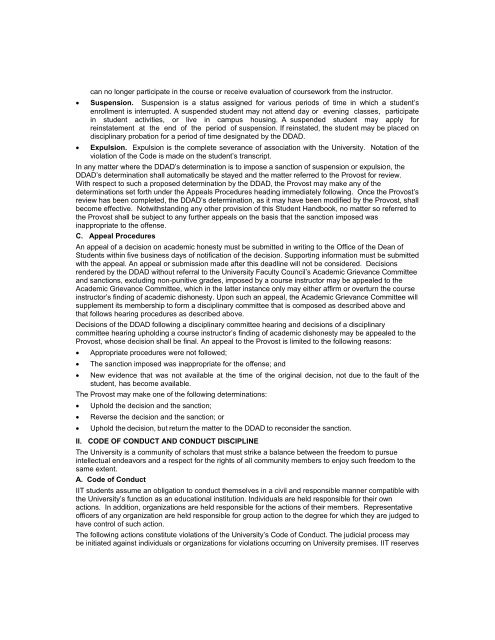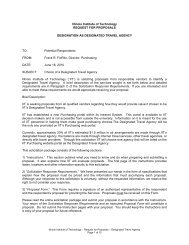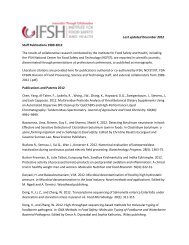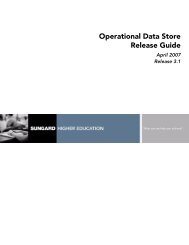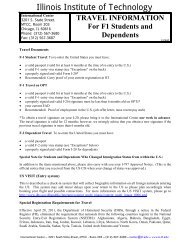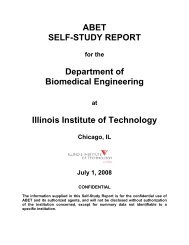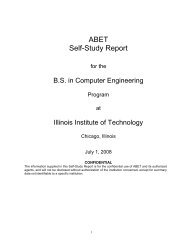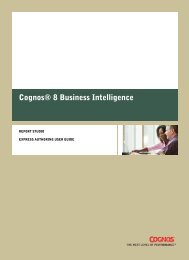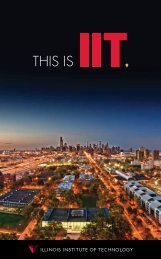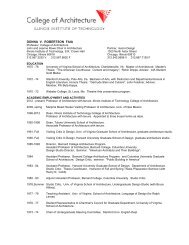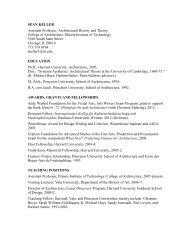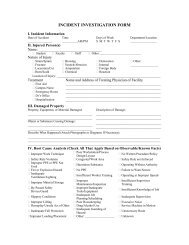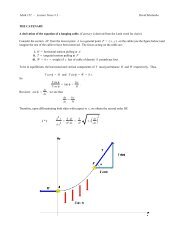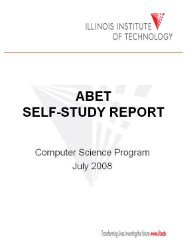Download entire Student Handbook - Illinois Institute of Technology
Download entire Student Handbook - Illinois Institute of Technology
Download entire Student Handbook - Illinois Institute of Technology
Create successful ePaper yourself
Turn your PDF publications into a flip-book with our unique Google optimized e-Paper software.
can no longer participate in the course or receive evaluation <strong>of</strong> coursework from the instructor.<br />
Suspension. Suspension is a status assigned for various periods <strong>of</strong> time in which a student’s<br />
enrollment is interrupted. A suspended student may not attend day or evening classes, participate<br />
in student activities, or live in campus housing. A suspended student may apply for<br />
reinstatement at the end <strong>of</strong> the period <strong>of</strong> suspension. If reinstated, the student may be placed on<br />
disciplinary probation for a period <strong>of</strong> time designated by the DDAD.<br />
<br />
Expulsion. Expulsion is the complete severance <strong>of</strong> association with the University. Notation <strong>of</strong> the<br />
violation <strong>of</strong> the Code is made on the student’s transcript.<br />
In any matter where the DDAD’s determination is to impose a sanction <strong>of</strong> suspension or expulsion, the<br />
DDAD’s determination shall automatically be stayed and the matter referred to the Provost for review.<br />
With respect to such a proposed determination by the DDAD, the Provost may make any <strong>of</strong> the<br />
determinations set forth under the Appeals Procedures heading immediately following. Once the Provost’s<br />
review has been completed, the DDAD’s determination, as it may have been modified by the Provost, shall<br />
become effective. Notwithstanding any other provision <strong>of</strong> this <strong>Student</strong> <strong>Handbook</strong>, no matter so referred to<br />
the Provost shall be subject to any further appeals on the basis that the sanction imposed was<br />
inappropriate to the <strong>of</strong>fense.<br />
C. Appeal Procedures<br />
An appeal <strong>of</strong> a decision on academic honesty must be submitted in writing to the Office <strong>of</strong> the Dean <strong>of</strong><br />
<strong>Student</strong>s within five business days <strong>of</strong> notification <strong>of</strong> the decision. Supporting information must be submitted<br />
with the appeal. An appeal or submission made after this deadline will not be considered. Decisions<br />
rendered by the DDAD without referral to the University Faculty Council’s Academic Grievance Committee<br />
and sanctions, excluding non-punitive grades, imposed by a course instructor may be appealed to the<br />
Academic Grievance Committee, which in the latter instance only may either affirm or overturn the course<br />
instructor’s finding <strong>of</strong> academic dishonesty. Upon such an appeal, the Academic Grievance Committee will<br />
supplement its membership to form a disciplinary committee that is composed as described above and<br />
that follows hearing procedures as described above.<br />
Decisions <strong>of</strong> the DDAD following a disciplinary committee hearing and decisions <strong>of</strong> a disciplinary<br />
committee hearing upholding a course instructor’s finding <strong>of</strong> academic dishonesty may be appealed to the<br />
Provost, whose decision shall be final. An appeal to the Provost is limited to the following reasons:<br />
<br />
<br />
<br />
Appropriate procedures were not followed;<br />
The sanction imposed was inappropriate for the <strong>of</strong>fense; and<br />
New evidence that was not available at the time <strong>of</strong> the original decision, not due to the fault <strong>of</strong> the<br />
student, has become available.<br />
The Provost may make one <strong>of</strong> the following determinations:<br />
<br />
<br />
<br />
Uphold the decision and the sanction;<br />
Reverse the decision and the sanction; or<br />
Uphold the decision, but return the matter to the DDAD to reconsider the sanction.<br />
II. CODE OF CONDUCT AND CONDUCT DISCIPLINE<br />
The University is a community <strong>of</strong> scholars that must strike a balance between the freedom to pursue<br />
intellectual endeavors and a respect for the rights <strong>of</strong> all community members to enjoy such freedom to the<br />
same extent.<br />
A. Code <strong>of</strong> Conduct<br />
IIT students assume an obligation to conduct themselves in a civil and responsible manner compatible with<br />
the University’s function as an educational institution. Individuals are held responsible for their own<br />
actions. In addition, organizations are held responsible for the actions <strong>of</strong> their members. Representative<br />
<strong>of</strong>ficers <strong>of</strong> any organization are held responsible for group action to the degree for which they are judged to<br />
have control <strong>of</strong> such action.<br />
The following actions constitute violations <strong>of</strong> the University’s Code <strong>of</strong> Conduct. The judicial process may<br />
be initiated against individuals or organizations for violations occurring on University premises. IIT reserves


